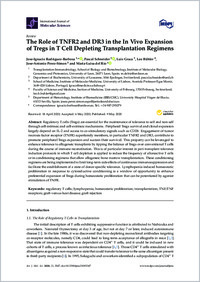The role of TNFR2 and DR3 in the in vivo expansion of tregs in T cell depleting transplantation regimens
- Rodriguez-Barbosa, Jose-Ignacio Transplantation Immunobiology, School of Biology and Biotechnology, Institute of Molecular Biology, Genomics and Proteomics, University of Leon, 24071 Leon, Spain
- Schneider, Pascal Department of Biochemistry, University of Lausanne, 1066 Epalinges, Switzerland
- Graca, Luis School of Medicine, Institute of Molecular Medicine, University of Lisbon, Avenida Professor Egas Moniz, 1649-028 Lisbon, Portugal
- Bühler, Leo Faculty of Science and Medicine, Section of Medicine, University of Fribourg, 1700 Fribourg, Switzerland
- Perez-Simon, Jose-Antonio Department of Hematology, Institute of Biomedicine (IBIS/CSIC), University Hospital Virgen del Rocio, 41013 Sevilla, Spain
- Rio, Maria-Luisa del Transplantation Immunobiology, School of Biology and Biotechnology, Institute of Molecular Biology, Genomics and Proteomics, University of Leon, 24071 Leon, Spain
-
09.05.2020
Published in:
- International Journal of Molecular Sciences. - 2020, vol. 21, no. 9, p. 3347
English
Regulatory T cells (Tregs) are essential for the maintenance of tolerance to self and non-self through cell-intrinsic and cell-extrinsic mechanisms. Peripheral Tregs survival and clonal expansion largely depend on IL-2 and access to co-stimulatory signals such as CD28. Engagement of tumor necrosis factor receptor (TNFR) superfamily members, in particular TNFR2 and DR3, contribute to promote peripheral Tregs expansion and sustain their survival. This property can be leveraged to enhance tolerance to allogeneic transplants by tipping the balance of Tregs over conventional T cells during the course of immune reconstitution. This is of particular interest in peri- transplant tolerance induction protocols in which T cell depletion is applied to reduce the frequency of alloreactive T cells or in conditioning regimens that allow allogeneic bone marrow transplantation. These conditioning regimens are being implemented to limit long-term side effects of continuous immunosuppression and facilitate the establishment of a state of donor-specific tolerance. Lymphopenia-induced homeostatic proliferation in response to cytoreductive conditioning is a window of opportunity to enhance preferential expansion of Tregs during homeostatic proliferation that can be potentiated by agonist stimulation of TNFR
- Faculty
- Faculté des sciences et de médecine
- Department
- Master en médecine
- Language
-
- English
- Classification
- Biological sciences
- License
-
License undefined
- Identifiers
-
- RERO DOC 328644
- DOI 10.3390/ijms21093347
- Persistent URL
- https://folia.unifr.ch/unifr/documents/308758
Statistics
Document views: 116
File downloads:
- pdf: 167
